Can cats eat applesauce? The quick answer: no, cats cannot safely consume applesauce. Your cat does not necessarily need applesauce, and it is not entirely safe for them either.
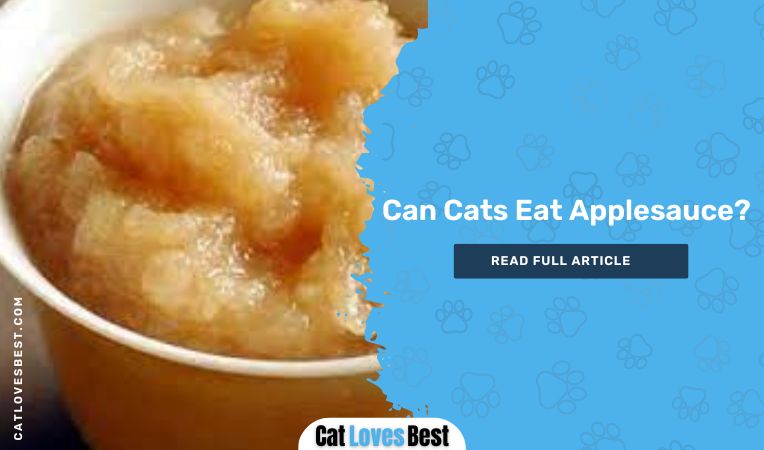
As we know, cats are obligate carnivores; although they have evolved to eating meat, a little dietary fiber can be helpful in their diet. However, as for applesauce — they do contain a lot of fiber, but the other ingredients included in the applesauce can be hazardous to your cat’s health.
However, before you think about feeding your wild child with this plant-based treat, you might want to keep certain things in mind.
Here’s everything you should be aware of on can cats eat applesauce and if they are bad for them.
What Is Applesauce?
As the word suggests, applesauce is a sauce, and it is made out of apple fruit. It is made by baking rather than boiling, in which apples are peeled and mashed together to reach the sauce consistency.
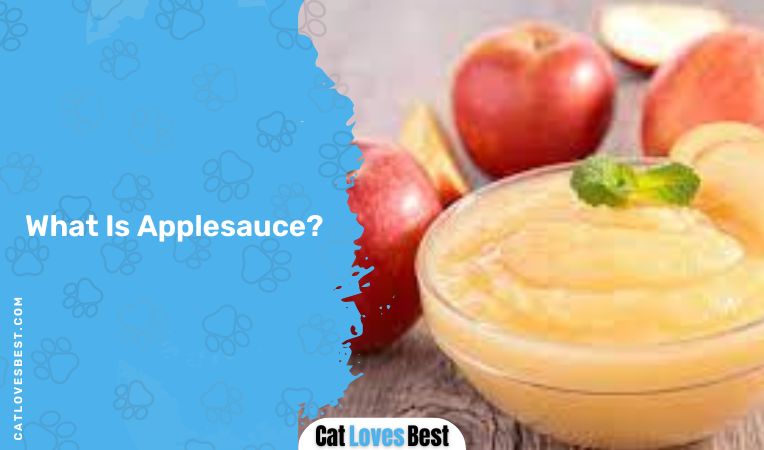
Sometimes it is also mixed with other ingredients, such as fruit pulp and cinnamon. But most importantly, apple remains the main ingredient here.
While applesauce is healthy for us humans, and even for dogs as well, but what about our feline friends?
Can cats eat applesauce? Is applesauce good for cats?
Can Cats Have Applesauce?
The short answer is no, cats cannot safely eat applesauce. In fact, processed applesauce can be harmful to cats’ health as it contains preservatives and high sugar content. However, if your cat takes a lick or two from homemade applesauce, it is safe as long as there are no preservatives and high sugar content.
Further, If we take a look at the ASPCA’s Animal Poison Control page, it states the leaves, stems, and seeds are toxic to cats. But it does not state the fruit, apple, in itself as toxic for cats.
In fact, ASPCA has listed apple as a pet-safe snack, meaning it is safe for cats to consume in moderation. However, this does not mean that applesauce is also safe for cats to consume. Thus, it is not recommended to feed applesauce to your cat.
But assuming that your cat snuck up a few licks, you don’t need to panic as long as the applesauce was homemade without any preservative and high sugar content.
Can Kittens Eat Applesauce?
No, kittens cannot safely eat applesauce. Even if your kitten really likes the smell of applesauce, you should not feed her. Processed applesauce can pose the same harmful effects as it does for adult cats.
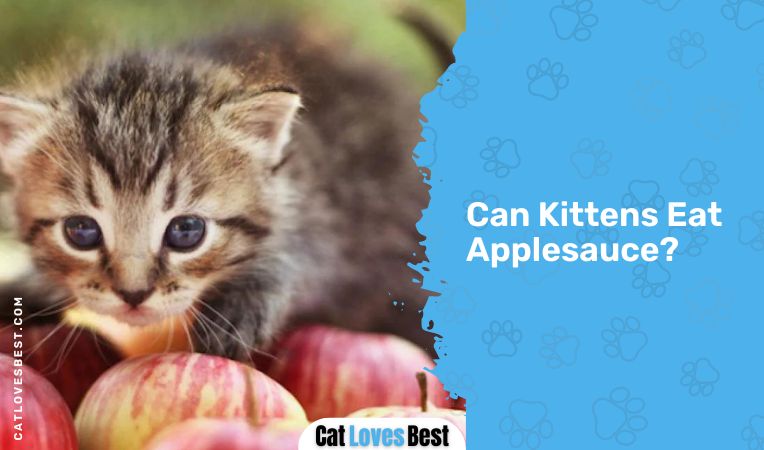
However, feeding a very tiny amount of homemade applesauce to your kitten won’t do any harm.
On the other hand, never feed store-bought, processed applesauce. The preservative and other constituents along with high sugar amount can be harmful to your cat’s health.
When Is Applesauce Good for Cats?
Apples are loaded with many nutrients, vitamins, together with high-fiber content, which can offer good health benefits.
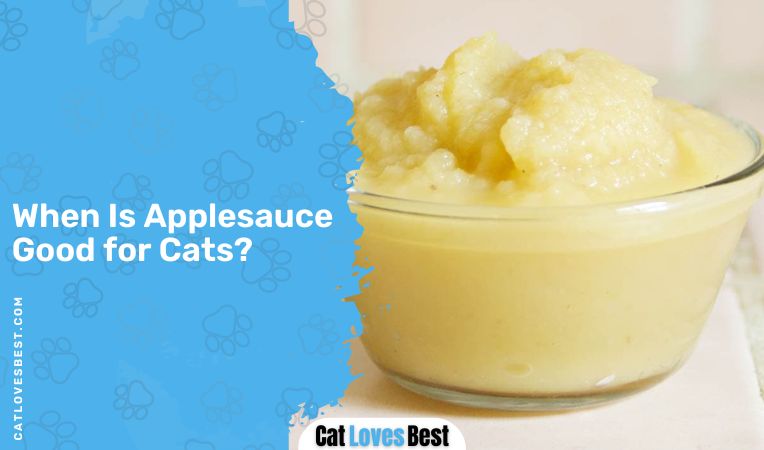
When fed to cats, it can help relieve constipation[1], indigestion, and other health issues. Likewise, applesauce is also high in nutrients and fiber amount.
If your cat likes to snack on this apple treat, then you should feed not more than a tiny amount of half spoon of homemade applesauce.
High-Fiber Content
The good side of the applesauce for cats comes especially from the high-fiber content. A small dose of dietary fiber in your cat’s diet can be beneficial to her health. The fiber content can help in alleviating mild symptoms of constipation and other digestive problems like diarrhea.
Moreover, this treat (applesauce) comes in a purée form, so it can be easier for cats to digest. Further, the fiber content can also absorb a good amount of water in the stomach, making stools softer and easier for cats to excrete.
When Is Applesauce Bad for My Cat?
Can applesauce be bad for your cat? Well, the answer to that question depends on the type of applesauce you are feeding your kitty. Packaged and processed applesauce is not particularly safe for cats to eat.
They contain an awful lot of sugar content, and it can lead to dental problems, obesity, diabetes, weight gain if you feed your cat applesauce more than often.
Sugar
Just as I previously mentioned, store-bought processed applesauce contains a lot of sugar, and it can be harmful to your cat in the long run.
Even an apple in itself is considered a safe option for people with diabetes, but for cats, it’s a different scenario. Our feline friends digest and absorb sugar differently than us. It doesn’t take time for their blood sugar level to reach its peak, even with mildly sweet treats.
Thus, the sugar contained within the applesauce can become the culprit for causing long-term health issues in your cat — including diabetes.
Processed Applesauce
Pretty much like any processed food made for humans, it usually contains preservatives and other chemicals. These artificial additives cannot harm us, but they can have negative effects on a cat’s digestive system.
Thus, the preservatives found in processed applesauce can be bad for your cat.
What Is the Safest Way to Feed Applesauce to Cats?
Cats don’t really need applesauce. However, if you really insist or your cat likes the taste, then there is a safe way you can give your cat applesauce.
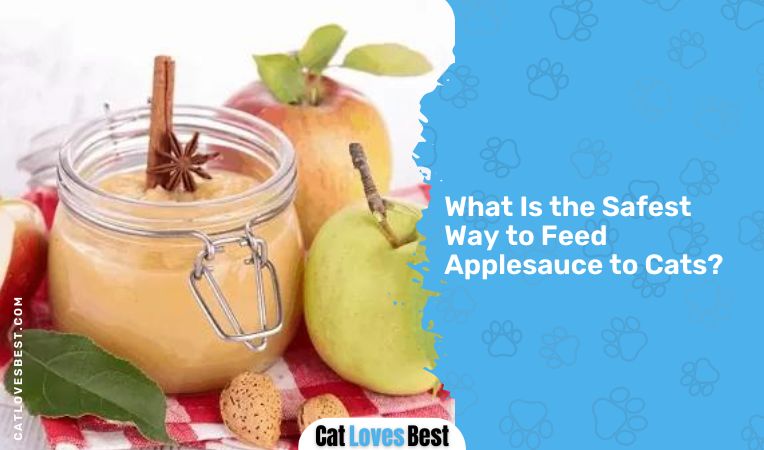
One thing to keep in mind is that you should never feed a store-bought, processed applesauce to your cat. The preservatives and high amount of sugar content and artificial sweeteners contained within can be harmful to your cat. It can likewise cause digestive issues or even an allergic reaction to your feline pal.
To be on the safe side, you can make cat-friendly applesauce at home with fresh, organic apples. In this way, you can avoid any artificial flavoring and any other potentially harmful ingredients.
How to Make Cat-Friendly Applesauce
Making applesauce at home is the best way you can ensure your cat doesn’t eat anything that can be harmful to her health. Homemade applesauce can be a healthy treat, in small quantities, of course.
Here’s how you can make your own cat-friendly applesauce at home:
| Ingredients | Instructions |
| Take four apples – peeled, chopped, and cored | Combine chopped apples, honey, and water in the saucepan |
| 2-4 tablespoons of honey | Cover the saucepan and bring the mixture to a simmer over medium heat |
| ⅔ cup of water | Keep simmering, and stirring occasionally until the apples start to become tender and fall apart |
| Cook over high for around 3-4 hours | |
| Allow to cool down, blend down to a smooth consistency, or you can mash down the chunks using a potato masher | |
| Let the applesauce cool down to room temperature before serving |
You can also serve this homemade applesauce cold. And, if you are thinking if honey is safe to add to the recipe, then fret not; honey is not toxic to cats.
How Much Applesauce Is Too Much for Your Cat?
If your cat likes to nibble on applesauce, then don’t worry; applesauce is not toxic to cats, assuming it is homemade.
However, if you are introducing applesauce daily to your cast’s diet, then it can lead to obesity and diabetes problems in the long run.
We suggest you give cats applesauce in small amounts, and only once in a while. Homemade applesauce is like an occasional treat for your cat, and it works the best if fed in moderation.
Final Thoughts
Can cats eat applesauce? The answer is no. Cats cannot safely eat applesauce. Processed applesauce contains plenty of unhealthy constituents that can be bad for your cat and kittens.
However, if you really insist on feeding it, we recommend that your furbaby only gets a taste of homemade applesauce, in tiny amounts.
Applesauce made at home with organic, fresh apples can be way safer than processed, store-bought applesauce. It can work as a great homemade treat that is not only safe but tasty as well.
Approved by Veterinary – Anthony Brooks, DVM!
References
- Elfenbein, H. D. (2022, August 24). Cat Constipation. Petmd. Retrieved September 5, 2022, from https://www.petmd.com/cat/conditions/digestive/c_ct_constipation_obstipation

